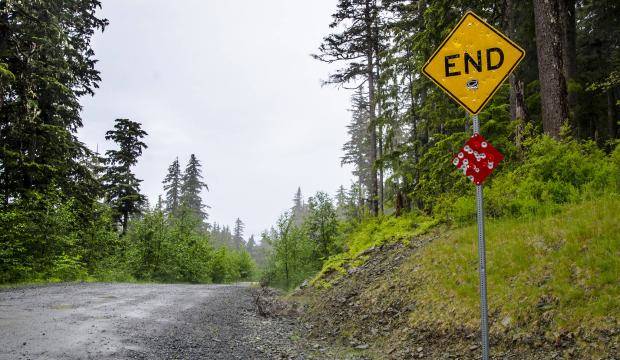Editor’s note: This article has been updated to include additional comments.
Nineteen months after Gov. Bill Walker killed the Juneau Access Project, the federal government has signed the death certificate.
In a document dated June 18 and published Thursday, Federal Highway Administration official Sandra A. Garcia-Aline declared, “Based on the information set forth … and as the state of Alaska has determined not to build the proposed project … it is also my decision to select Alternative 1 — No Action as the proposed action for this project.”
The document concludes that the road out of Juneau will not be built for two principal factors: The shrinking state budget and “a high level of controversy” over construction.
No issue has divided Juneauites more than the Juneau Access Project, which has become colloquially known as “The Road.” Votes and polls taken at various times have shown varying degrees of support for the project, with support growing in recent years as the Alaska Legislature has slashed the budget of the Alaska Marine Highway System.
“There isn’t much to think. It’s where the governor said we were going a year and a half ago,” said Denny DeWitt, director of the First Things First Foundation, which has promoted construction of the road to boost Juneau’s economy.
He said the biggest obstacle to the project has been Walker’s opposition.
“All it requires is a governor who wants to build infrastructure,” he said of the project. “I don’t think we’re really any substantially different from where we were three years ago.”
“The road will ultimately go to Skagway,” he said. “This is another slight delay in moving forward toward that end.”
Opponents, like proponents, have been vocal and organized, and they praised Thursday’s announcement.
“I am so happy,” said Rosa Miller, an Aak’w Kwaan Tlingit elder who has opposed road plans for decades.
Miller, who turns 92 on Friday, said the road would have passed through Aak’w Kwaan country, and it was important to her that it be preserved in as natural a state as possible.
She profusely thanked Walker for his decision to cancel the project and also praised Lt. Gov. Byron Mallott.
“Gunalchéesh,” she said by phone.
Buck Lindekugel, an attorney for the SouthEast Alaska Conservation Council, which fought the project, said by phone that the record of decision is “a huge victory.”
“This road was unsafe and impractical and the costs always outweighed the benefits and it just didn’t make sense,” he said. “We thank the governor for his steadfast opposition, and we are glad to see the agencies take this action.
In a prepared comment, Walker said, “The FHWA no-build record of decision for the Juneau Access road closes the previously proposed project. The funding that the legislature appropriated will not be spent, and will remain in the account until acceptable alternative concepts to advance transportation access for Juneau are proposed and agreed upon by stakeholders.”
The federal decision formally ends a project that began almost 25 years ago when the Alaska Department of Transportation began preliminary work on means to improve transportation between Juneau and the northern end of Lynn Canal.
The department analyzed means to improve ferry service from existing facilities, but it ultimately settled on construction of a road north from Juneau to a new ferry terminal at the mouth of the Katzehein River.
That road would have shortened the ferry run between Juneau’s road system and the North American road network, but it was almost immediately challenged in court. Between 2006 and 2011, the project was tied up in an extensive legal battle.
When it emerged, the state needed to restart its environmental review. That wrapped up just as oil prices plunged, and in December 2016, Gov. Bill Walker said he would not proceed with construction.
Walker has maintained that decision, and this week’s announcement is confirmation that the federal government will follow suit.
According to figures provided by DOT spokeswoman Aurah Landau, the state has spent $32.5 million on the project to date: $29.2 million from the federal government and $3.4 million in state funding.
Those figures do not include associated costs, such as $16.5 million spent on extending Glacier Highway, or money spent on legal fees.
According to figures provided by DOT, some $42.6 million remains unallocated in project accounts. That money has been preserved by the Alaska Legislature even though there is no plan to spend it.
A road connecting Juneau to the North American road network has been discussed on and off for the past 113 years. A 1905 discussion of a wagon road to Atlin, British Columbia is the earliest known instance.
If the project were to be revived, it isn’t clear what — if any — information from Juneau Access could be re-used. The longer the gap between Juneau Access and any new project, the less information can be re-used.
• Contact reporter James Brooks at jbrooks@juneauempire.com or 523-2258.

